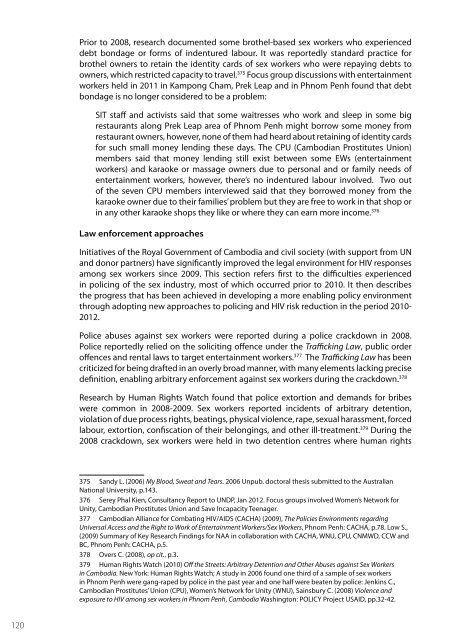SEX WORK AND THE LAW - HIV/AIDS Data Hub
SEX WORK AND THE LAW - HIV/AIDS Data Hub
SEX WORK AND THE LAW - HIV/AIDS Data Hub
Create successful ePaper yourself
Turn your PDF publications into a flip-book with our unique Google optimized e-Paper software.
Prior to 2008, research documented some brothel-based sex workers who experienced<br />
debt bondage or forms of indentured labour. It was reportedly standard practice for<br />
brothel owners to retain the identity cards of sex workers who were repaying debts to<br />
owners, which restricted capacity to travel. 375 Focus group discussions with entertainment<br />
workers held in 2011 in Kampong Cham, Prek Leap and in Phnom Penh found that debt<br />
bondage is no longer considered to be a problem:<br />
SIT staff and activists said that some waitresses who work and sleep in some big<br />
restaurants along Prek Leap area of Phnom Penh might borrow some money from<br />
restaurant owners, however, none of them had heard about retaining of identity cards<br />
for such small money lending these days. The CPU (Cambodian Prostitutes Union)<br />
members said that money lending still exist between some EWs (entertainment<br />
workers) and karaoke or massage owners due to personal and or family needs of<br />
entertainment workers, however, there’s no indentured labour involved. Two out<br />
of the seven CPU members interviewed said that they borrowed money from the<br />
karaoke owner due to their families’ problem but they are free to work in that shop or<br />
in any other karaoke shops they like or where they can earn more income. 376<br />
Law enforcement approaches<br />
Initiatives of the Royal Government of Cambodia and civil society (with support from UN<br />
and donor partners) have significantly improved the legal environment for <strong>HIV</strong> responses<br />
among sex workers since 2009. This section refers first to the difficulties experienced<br />
in policing of the sex industry, most of which occurred prior to 2010. It then describes<br />
the progress that has been achieved in developing a more enabling policy environment<br />
through adopting new approaches to policing and <strong>HIV</strong> risk reduction in the period 2010-<br />
2012.<br />
Police abuses against sex workers were reported during a police crackdown in 2008.<br />
Police reportedly relied on the soliciting offence under the Trafficking Law, public order<br />
offences and rental laws to target entertainment workers. 377 The Trafficking Law has been<br />
criticized for being drafted in an overly broad manner, with many elements lacking precise<br />
definition, enabling arbitrary enforcement against sex workers during the crackdown. 378<br />
Research by Human Rights Watch found that police extortion and demands for bribes<br />
were common in 2008-2009. Sex workers reported incidents of arbitrary detention,<br />
violation of due process rights, beatings, physical violence, rape, sexual harassment, forced<br />
labour, extortion, confiscation of their belongings, and other ill-treatment. 379 During the<br />
2008 crackdown, sex workers were held in two detention centres where human rights<br />
375 Sandy L. (2006) My Blood, Sweat and Tears. 2006 Unpub. doctoral thesis submitted to the Australian<br />
National University, p.143.<br />
376 Serey Phal Kien, Consultancy Report to UNDP, Jan 2012. Focus groups involved Women’s Network for<br />
Unity, Cambodian Prostitutes Union and Save Incapacity Teenager.<br />
377 Cambodian Alliance for Combating <strong>HIV</strong>/<strong>AIDS</strong> (CACHA) (2009), The Policies Environments regarding<br />
Universal Access and the Right to Work of Entertainment Workers/Sex Workers, Phnom Penh: CACHA, p.78. Low S.,<br />
(2009) Summary of Key Research Findings for NAA in collaboration with CACHA, WNU, CPU, CNMWD, CCW and<br />
BC, Phnom Penh: CACHA, p.5.<br />
378 Overs C. (2008), op cit., p.3.<br />
379 Human Rights Watch (2010) Off the Streets: Arbitrary Detention and Other Abuses against Sex Workers<br />
in Cambodia. New York: Human Rights Watch; A study in 2006 found one third of a sample of sex workers<br />
in Phnom Penh were gang-raped by police in the past year and one half were beaten by police: Jenkins C.,<br />
Cambodian Prostitutes’ Union (CPU), Women’s Network for Unity (WNU), Sainsbury C. (2008) Violence and<br />
exposure to <strong>HIV</strong> among sex workers in Phnom Penh, Cambodia Washington: POLICY Project USAID, pp.32-42.<br />
120
















